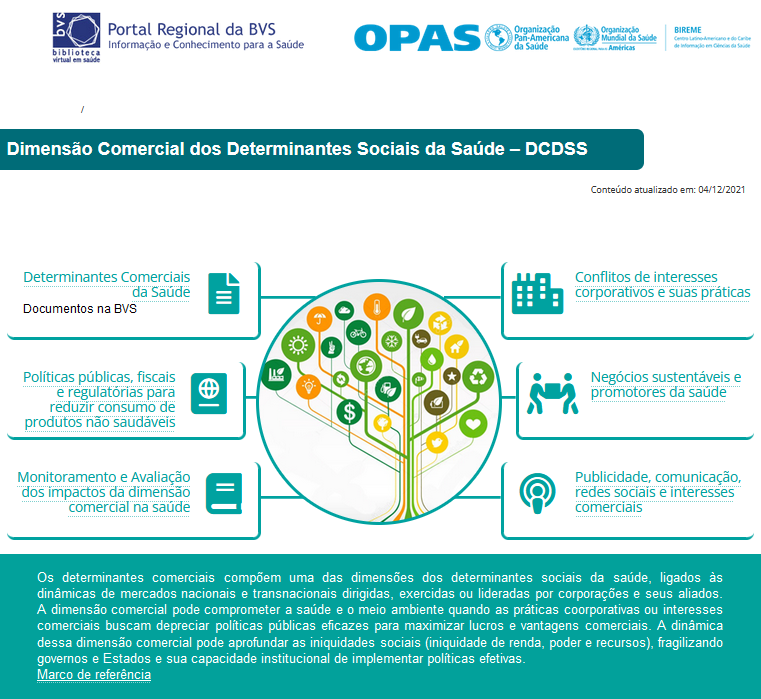BIREME, in cooperation with the National Workshop on Social Determinants of Health, Equity and Health Promotion of the Technical Unit on Determinants of Health, Chronic Noncommunicable Diseases and Mental Health of PAHO Brazil and a Working Group formed by more than 50 experts, which highlighted the general and transversal axes of the Commercial Dimension of Health, supporting thematic searches and the indication of reference documents indexed in the VHL databases, built a Window of Knowledge on the Commercial Dimension of Social Determinants of Health (DCDSS).
The concept of Commercial Determinants of Health, developed by Ilona Kickbush[1], was taken up within the scope of the 9th Global Conference on Health Promotion[2], held in Shanghai in 2016, as a challenge to the construction of new narratives to renew health promotion and face the determinants that negatively impact the health of populations in current times.
The term refers to “strategies and approaches used by the private sector to promote products and choices that are harmful to health”. According to Kickbush1, the commercial determinants of health encompass factors such as behavior and individual choices related to consumption and lifestyle, and issues related to global society, such as consumption risks, political economy, and globalization.
According to Kickbush et al.[3], commercial determinants are influenced by three dynamics: motor forces (drivers), channels, and results/impacts (outcomes). The authors explain that DCDSS, generated by the internationalization of the market and capital, by the growth in demand and by the expansion of corporations’ reach, have an impact on the environment, on consumers, and on health. The breadth and depth of corporate influence expands as it reaches more people, offering and providing more consumption options, through marketing, supply chain, lobbying, and corporate citizenship. Health outcomes or impacts are determined by the influence of channels in the environment where people live, work, and circulate the availability and accessibility of unhealthy products at affordable prices, shaping consumer lifestyles and choices.
 In the context of the Health Promotion Renewal, PAHO, together with institutions and technicians from different areas – Ministries of Health, Education, Social Development, Industry and Commerce, UNDP, NGOs and universities – and with the participation of international experts, has been carrying out, since 2018, different movements to address the topic, from which a report, a reference document and a Working Group were created, which participated in the preparation of reference documents as well as in supporting the structuring of a Window of Knowledge.
In the context of the Health Promotion Renewal, PAHO, together with institutions and technicians from different areas – Ministries of Health, Education, Social Development, Industry and Commerce, UNDP, NGOs and universities – and with the participation of international experts, has been carrying out, since 2018, different movements to address the topic, from which a report, a reference document and a Working Group were created, which participated in the preparation of reference documents as well as in supporting the structuring of a Window of Knowledge.
Recently, the WHO incorporated an area for the topic of Commercial Determinants of Health into its organizational structure, and PAHO Headquarters will hold an event/consultation on the topic in the Region of the Americas on November 30th.
The content of the DCDSS Showcase was built collaboratively by the BIREME|PAHO|WHO team based on the content indicated by a Working Group (WG) composed of more than 50 specialists who highlighted the general and transversal axes of the Commercial Health Dimension, subsidizing the thematic searches and the indication of reference documents that were indexed in the VHL databases.
The Window was launched in an online event on November 19th, inaugurated by Sebastián Garcia Saisó, Director of BIREME a.i. and EIH Director of PAHO/WHO, who stated that “this topic of great relevance seeks to generate a better understanding of the effects linked to the market and that directly or indirectly affect the health of individuals, communities, and society as a whole”. Saisó also thanked everyone who participated in this project and the PAHO/WHO representation in Brazil for their dedicated effort, stating that he was certain that the “Window will be a very useful tool so that together we can work and continue working with the health of our peoples leaving no one behind”. The event was moderated by Regiane Rezende, consultant to PAHO/WHO Brazil and member of the WG DCDSS.
Then, Gerry Eijekmans, Coordinator of the Technical Unit on SDH and Health Promotion at PAHO/WHO, spoke about the challenges in the Americas related to the social determinants of health. Paula Johns, Director General, and member of the WG DCDSS, spoke about the fight against chronic non-communicable diseases. Ricardo Brandão, a professor at the Universidade Estadual do Rio de Janeiro and a member of the WG explained the articulation of Commercial Determinants with other themes. Regiane Rezende, Rosemeire Pinto, supervisor of the Customer Service and Training area at BIREME, and Verônica Abdala, Manager of Services and Information Sources at BIREME, were responsible for the presentation of the DCDSS Window of Knowledge.
It is expected that the Window can support this movement in the Region of the Americas, stimulating the implementation of concrete actions to face the commercial dimension of SDH in Brazil and other countries in the Region of the Americas, with the formation of strategic alliances, production and dissemination of evidence, elaboration and implementation and legislation that protects people’s health, strengthening of participation and social control, among others.
Access the DCDSS Window of Knowledge.
This article had the collaboration of Regiane Resende, consultant of PAHO/WHO Brazil.
[1] Kickbusch, I. In the health field, addressing determinants of a commercial nature is of fundamental importance for emerging countries. Editorial Ciênc. saúde coletiva 20 (4). Abr. 2015. https://doi.org/10.1590/1413-81232015204.19962014
[2] 9th Global Conference on Health Promotion 2016. https://www.who.int/news/item/21-11-2016-9th-global-conference-on-health-promotion-global-leaders-agree-to-promote-health-in-order-to-achieve-sustainable-development-goals
[3] Kickbusch, I, Allen, L, and Franz, C. The commercial determinants of health. Lancet Glob Health. 2016 4:e895-e896. https://doi.org/10.1016/S2214-109X(16)30217-0